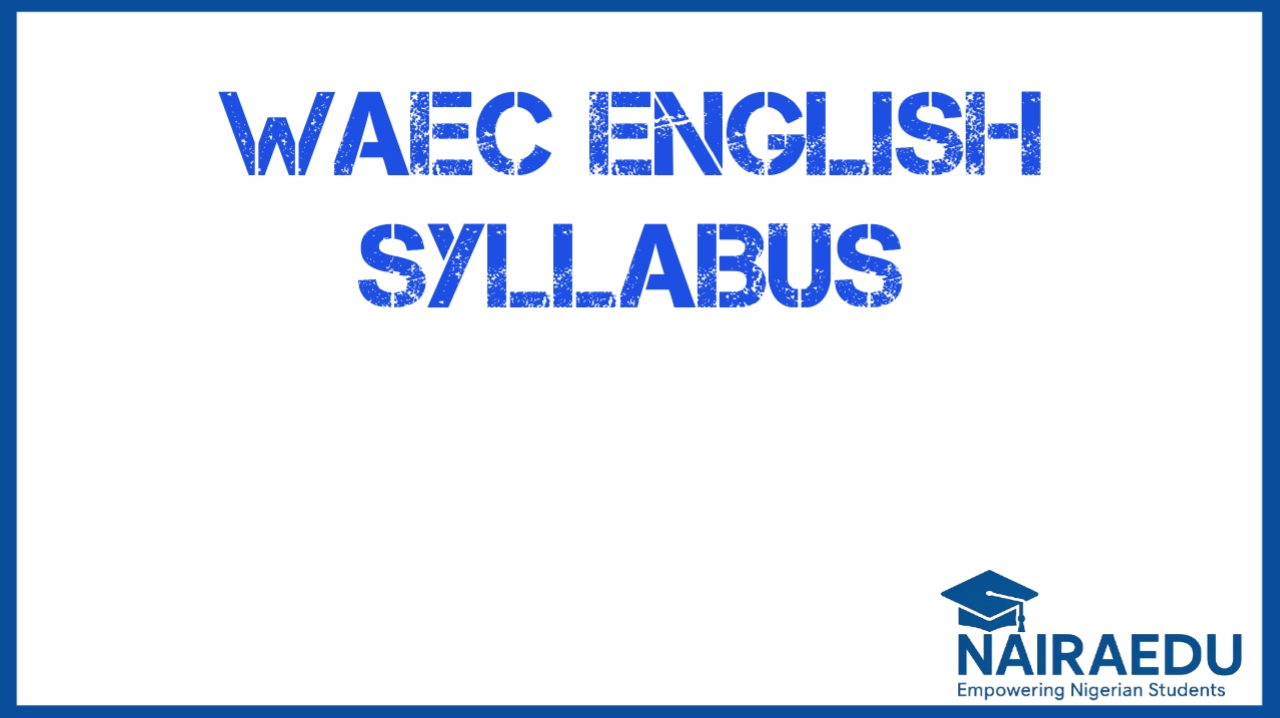The WAEC Syllabus for English Language 2026 is your definitive guide to mastering communication skills for the upcoming WASSCE. At Nairaedu.com, we understand that English is more than just a subject; it’s a foundation for success in all other areas of life and academics.
This comprehensive guide simplifies the official syllabus, providing a clear roadmap to help you focus on key topics, understand the exam structure, and develop the skills needed to achieve an A1.
This guide is designed to help you prepare effectively for all three papers of the WAEC English Language exam. Whether you need to sharpen your essay writing, improve your comprehension skills, or ace the oral English section, this breakdown will ensure you are fully prepared.
Aims and Objectives of the WAEC English Language Syllabus
The WAEC English Language syllabus is designed with a clear purpose: to assess and foster a high level of proficiency in students. The core objectives are to ensure you can:
- Use English Correctly: Demonstrate a strong command of grammar, syntax, spelling, and punctuation to communicate accurately and effectively in both spoken and written forms.
- Analyze and Comprehend: Understand written passages by extracting key information, identifying main ideas, and interpreting tone, attitude, and implied meaning.
- Master Oral Communication: Recognize and produce standard English sounds, intonation, and stress patterns, and understand spoken communication in various contexts.
- Think Critically and Creatively: Organize your thoughts logically and creatively through diverse writing tasks, including argumentative, narrative, and descriptive essays.
These objectives highlight the importance of not just memorizing rules but truly understanding and applying the English language in practical situations.
Understanding the WAEC English Language Examination Scheme
The WAEC English Language exam is structured into three papers, each testing a specific set of skills. Knowing this structure is your first step toward building a successful study plan.
1. Paper 1: Objective Questions
Duration: 1 hour
Total Marks: 40 marks
Content: This paper consists of 80 multiple-choice questions on Lexis and Structure. It assesses your knowledge of vocabulary, grammar, sentence construction, and idiomatic expressions. Questions often test your ability to fill in gaps in sentences, identify synonyms and antonyms, and correct errors in grammar.
2. Paper 2: Essay, Comprehension, and Summary
Duration: 2 hours
Total Marks: 100 marks
Content: This paper is a comprehensive test of your written communication skills.
- Essay Writing: You will be given a variety of topics and must choose one to write on. The topics cover different essay types, including formal letters, informal letters, speeches, narratives, descriptive essays, and argumentative essays. The key is to demonstrate a logical flow of ideas, strong paragraphing, and a wide vocabulary.
- Comprehension: You will be given a passage to read and answer questions on. This section tests your ability to understand the passage’s main points, identify the author’s tone, and extract specific details. Questions may also test your knowledge of vocabulary as used in the context of the passage.
- Summary: You will be required to extract and summarize key points from a different passage. The goal is to present the information clearly and concisely, without adding any new details. Adhering to the specified word count is crucial.
3. Paper 3: Oral English
Duration: 45 minutes
Total Marks: 30 marks
Content: This paper assesses your spoken English skills through multiple-choice questions based on audio recordings. It focuses on:
- Phonetics: Recognizing and distinguishing between different English vowel and consonant sounds, including long and short vowels, diphthongs, and triphthongs.
- Stress and Intonation: Identifying where stress is placed within words and sentences, and understanding the use of rising and falling intonation to convey meaning.
- Rhyme and Sound Patterns: Recognizing rhyming words and understanding the rhythm of spoken English.
Detailed Breakdown of the WAEC English Language 2026 Syllabus
To prepare effectively, you need to understand the specifics of each section of the syllabus. Below is a detailed breakdown of the key areas you must master.
1. Lexis and Structure
This is the foundation of the English language. You must focus on:
- Vocabulary: Build your word bank by reading widely. Understand synonyms and antonyms, and know the difference between formal and informal language.
- Grammar: Master fundamental grammar rules, including subject-verb agreement (concord), correct use of tenses, prepositions, and conjunctions.
- Idioms and Figurative Expressions: Learn the meanings of common idioms, proverbs, and phrasal verbs, and understand how they are used in context.
- Punctuation and Spelling: Pay close attention to commas, apostrophes, full stops, and other punctuation marks. Practice your spelling to avoid losing marks for careless errors.
2. Essay Writing
The essay paper is where you demonstrate your creative and critical thinking skills. To excel, you must:
- Understand Essay Types: Know the format and style of different essays. For example, a narrative essay requires a story with a clear plot, characters, and setting, while an argumentative essay requires a strong thesis statement and logical supporting arguments.
- Structure Your Ideas: Plan your essay with a clear introduction, body paragraphs, and a conclusion. Each paragraph should contain a single main idea supported by relevant details.
- Develop a Unique Style: Use vivid language, strong verbs, and a variety of sentence structures to make your writing engaging.
3. Comprehension
This section tests your reading skills. To prepare, you should:
- Read Widely: Read articles, newspapers, and books on various subjects. This will expose you to a wide range of vocabulary and ideas.
- Practice Identifying Key Information: After reading a passage, try to summarize the main idea in one or two sentences. This will help you identify what is most important.
- Pay Attention to Clues: Look for clues in the text that reveal the author’s tone, attitude, and purpose.
4. Summary
Summary writing is about precision and conciseness. You need to:
- Read the Passage Carefully: Read the passage multiple times to fully understand its content.
- Identify Main Points: Underline or note down the most important points. Leave out all examples, illustrations, and repetitive phrases.
- Write in Your Own Words: Do not copy sentences directly from the passage. Paraphrase the key points concisely.
- Stick to the Word Count: This is a common mistake. Ensure your final summary is within the specified word limit.
5. Oral English
This section can be challenging, but it is easy to master with practice. You should:
- Listen to Authentic English: Listen to English news, podcasts, and audiobooks. Pay attention to how native speakers pronounce words and use intonation.
- Practice Pronunciation: Use a dictionary with phonetic transcriptions to learn the correct pronunciation of words. Practice saying them out loud.
- Focus on Stress: Understand the difference between stressed and unstressed syllables in words and sentences. This is a crucial part of the oral exam.
Proven Strategies for Passing the WAEC English Exam
Knowledge of the syllabus is not enough. You need a smart strategy to prepare. Here are some tips to help you:
- Create a Study Timetable: Allocate specific time slots for each section of the syllabus. For example, dedicate 30 minutes daily to studying new vocabulary and idioms.
- Practice with Past Questions: WAEC past questions are invaluable. They help you understand the format, anticipate question types, and improve your speed. Aim to solve at least one full paper each week under timed conditions.
- Read Extensively: The more you read, the better your vocabulary and grammar will become. Read novels, newspapers, and online articles on various topics to expand your knowledge base.
- Get Feedback: Write practice essays and have a teacher or a knowledgeable peer review them. Constructive criticism can help you identify your weaknesses and improve your writing.
Common Mistakes to Avoid
To maximize your score, be aware of these common errors:
- Ignoring the Word Count: In essay and summary writing, exceeding or falling short of the word count can lead to a loss of marks.
- Poor Punctuation: Missing commas, misplaced apostrophes, or incorrect use of full stops can make your writing unclear and cost you points.
- Spelling Errors: Be careful with your spelling. Simple errors can make you seem careless and affect your overall score.
- Memorizing Essays: Avoid memorizing and reproducing essays. Examiners can spot this easily, and it will result in a low score. Instead, understand the structure and write your own unique essays.
YOU MAY ALSO LIKE:
WAEC Syllabus for Physics 2026
2026 WAEC Syllabus for Chemistry
WAEC Syllabus for Biology 2026, Study Guide & Key Topics
Breaking: WAEC Announces Registration Dates & New Format for WASSCE 2026
FAQs About WAEC English 2026
Q1: What are the key differences between the WAEC 2025 and 2026 English Language syllabuses?
Typically, the WAEC syllabus undergoes minor revisions. The 2025 syllabus remains the most relevant guide. Any new changes for 2026 will likely be minor and will be announced by WAEC.
Q2: Is a dictionary allowed in the WAEC English Language exam?
No, dictionaries are not permitted during the WAEC examination.
Q3: How important is Oral English?
Oral English is a compulsory paper. Your score in this section contributes significantly to your overall grade in English Language. You must prepare adequately for it.
For more study resources and information, be sure to visit Nairaedu.com. We are committed to providing you with the best tools to achieve academic excellence.

Mr. Femi is an education blogger who simplifies exam updates and study tips for Nigerian students. His goal is to make learning smart, easy, and rewarding.


2 thoughts on “WAEC Syllabus for English Language 2026”